Imagine a world without poverty, hunger, and hatred. It’s an attractive thought, but is it possible? The word utopia was coined by Thomas More in 1516 in his book about a fictional island society. Originally, More intended the term to mean “no place” from the Greek οὐ (“not”) and τόπος (“place”), but over time the οὐ was conflated with εὖ (“good”).
This twist in meaning is strangely fitting given the nature of utopian fiction. Can a “good place” exist, or is it all just smoke and mirrors concealing some horrible, hidden truth? Is a utopia even compatible with human nature? Authors of the genre grapple with these questions, often walking a fine line between utopian and dystopian descriptions. Intrigued? We’ve got some vital utopian novels for you to check out below.
Utopian stories aren’t as popular as dystopian fiction, perhaps because we’re more used to stories of darkness and pessimism than those that imagine a more hopeful society. but they do exist in sci-fi and fantasy, pathways to better worlds or cautionary tales of how seeming perfection can quickly give way to sourness and corruption. Here are some beloved and underrated utopian SFF stories that you should read in preparation for Megalopolis, the long-awaited cinematic return of the legendary director Francis Ford Coppola.
The man who brought the world The Godfather and Apocalypse Now has partly self-funded his decades’ long dream project, a utopian sci-fi drama about a visionary young architect who wants to rebuild the grand city of New Rome in preparation for a bright new future. Try these books before the movie hits the screen on September 27.
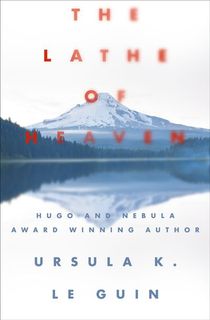
The Lathe of Heaven
What if your dreams could control your reality? What would you dream of—an end to world hunger, to prejudice and discrimination? What about world peace? Such power may seem enticing to many, but not to George Orr. Living in a future (and still rainy) Portland, Oregon, George’s dreams are coming to life.
Disturbed and desperate for help, he turns to psychiatrist Dr. William Haber, who immediately recognizes the power George possesses and begins to manipulate him. The two men quickly discover the disastrous results of playing God.
In this deeply philosophical and riveting novel, acclaimed science fiction author Ursula K. Le Guin addresses the dangers of power and the volatility of human nature. This book is a must-read for any science fiction enthusiast.
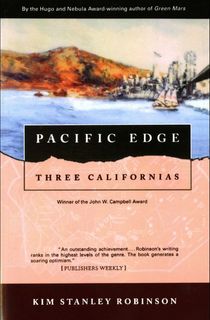
Pacific Edge
Kim Stanley Robinson has won almost every major SFF award and was described by The Atlantic as "the gold standard of realistic, and highly literary, science-fiction writing." The Three Californias Trilogy, published between 1984 and 1990, depicts three possible futures for Orange County, where Robinson grew up.
The third book, Pacific Edge, is set in 2065 and envisions a California that has become an ecotopia. Kevin Claiborne, a young builder who has grown up in this "green" world, finds himself caught up in the struggle to preserve his community's hopeful way of life as local developers seek to bring back an era of greed and destruction.
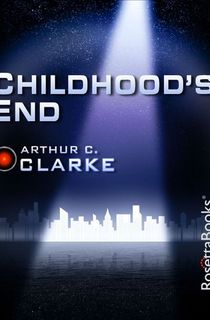
Childhood's End
When the Overlords arrived on Earth, everything changed. Technologically and intellectually superior, they could have violently imposed their will on humanity. Instead, they demanded peace, ushering in a Golden Age where there were no wars, no poverty, no suffering.
But this utopia comes at a price, as the people of Earth soon begin to realize. With all the world’s problems solved, there is no need for human ingenuity or creativity. Humans become restless, eager for the movement and change that once built empires. But with the overwhelming power of the Overlords bearing down on the world, resistance to this illusory peace could bring about the end of civilization.
Divided into three parts, this classic of alien literature expands on Arthur C. Clarke's short story “Guardian Angel,” and is told through the perspective of an anonymous omniscient narrator.

Enemies of the System
In the far future, Homo sapiens evolve into Homo uniformis, a fully civilized species of humankind no longer affected by the flaws of human nature like war, disease, and emotion.
From this utopia come fifty-two elites on a tour of Lysenka. After an accident leaves them stranded, they soon discover that the planet is home to the descendants of a crashed spaceship. Over the course of a million years, these humans have devolved in ways unimaginable.
Faced with a horrifying glimpse into their future should they remain, the utopian elites must find a way to escape before they are consumed by the animal within.

Venus Plus X
Charlie Johns awakes a stranger in a strange new world. Believing that he somehow was transported to the future, Charlie learns that he is in the country of Ledom.
In this utopia, all humanity’s problems have been solved by technological innovation and, to Charlie’s surprise, eradicating biological sex.
The inhabitants of Ledom are determined to convince Charlie of the benefits of living in this model society, but things are not as they seem.

The Reality Dysfunction
It's 2600 A.D., and the human race is moving into the stars. Hundreds of planets across the galaxy have been colonized and are home to a variety of cultures. Genetic engineering has pushed evolution into unexpected new heights, birthing extraordinary new species and space-born creatures.
Huge fleets of sentient trader starships thrive on the wealth created by the industrialization of the galaxy, and it's the job of the Confederation Navy to keep the peace across space. But peacetime might be coming to an end. On a primitive colony planet a renegade criminal's chance encounter with an unfamiliar alien species sparks fear of total extinction.

Ecotopia
This book about a sustainable environmentalist utopia follows journalist Will Weston, the first American citizen to enter Ecotopia. Twenty years prior, Northern California, Washington, and Oregon seceded from the Union, forming their own country in the hopes of creating a “stable-state” ecosystem. Ecotopia is now a thriving civilization with energy-efficient cities, pollution control, and a matriarchal government.
Although initially skeptical, Will soon finds himself enchanted by the Ecotopian lifestyle and impressed by their progress. Ernest Callenbach tells the story through a collection of diary entries and articles written by Will. Hopeful and inspiring, this science fiction environmental classic has maintained its relevance since its initial publication in 1975.

Island
In this utopian counterpart to Huxley’s dystopian Brave New World, a thriving and prosperous island nation in the Pacific attracts the eye of an English journalist and the envy of the world.
William Farnaby, journalist and lackey of oil baron Lord Joseph Aldehyde, has successfully managed to wreck his ship on the shores of Pala. All according to plan—with the exception of a leg injury.
As an agent of a conspiracy to take over Pala, Farnaby has arrived with a mission: convince the island’s queen, the Rani, to sell Aldehyde Pala’s oil rights. But to his surprise, Farnaby soon finds himself enthralled by the Palanese spiritualism, philosophy, and culture.
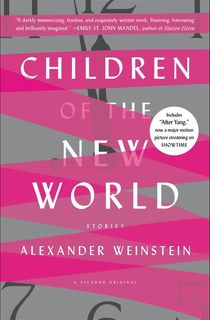
Children of the New World
Writer Alexander Weinstein's collection of short stories imagine world of our near-future where technological advances have led to a utopian world of instant connection between others. But all is not well in this place, and the promises of immersive virtual reality and social media implants have curdled for some.
Robotic siblings malfunction, VR games become all too real, and companies create and sell memories that prove more addictive than those we make in real life.

Methuselah's Children
Set in Robert A. Heinlein’s Future History universe, this classic science fiction novel introduces Lazarus Long—the kilt-wearing, gun-strapped immortal space traveler featured in several of Heinlein’s books.
Lazarus is old, so old he can’t remember how old he is. Descended from a family bred for health and longevity, Lazarus and his extended brethren live in secret.
When their abilities are revealed to the world, they're forced to flee Earth before the government and the public, eager for the chance at immortality, can get their greedy hands on them. Hijacking a spaceship, Lazarus and co. sail through the universe looking for another world to call home.
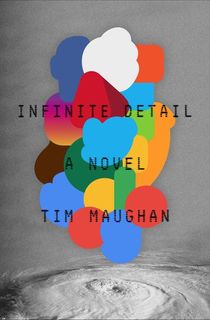
Infinite Detail
An act of anonymous cyberterrorism has permanently switched off the Internet, causing the world to collapse. The only safe space is The Croft, a community in the middle of Bristol that has long acted as a digital no-man's-land. Its chief architect, Rushdi Mannan, crafted a place where there is no surveillance, no algorithms, and no data tracking.
But the Croft is falling apart at the seams, made all the worse by the rest of the world's troubles. Should they fight to save what the Croft was built to be or should it evolve into something else?

The Blazing World
The Description of a New World, Called The Blazing-World, better known as simply The Blazing World, was published in 1666 and is widely cited as one of the first works of science fiction. Its writer, Margaret Cavendish, the Duchess of Newcastle, was a writer, philosopher, and poet who was known for pushing against society's rigid status quo regarding women.
Her most famous work imagines a woman who travels to a new kingdom via the North Pole and becomes its Empress. She uses her new status to create a utopian world where there is no war, sexism, or religious discrimination, where there are no societal divides like the ones that have hindered progress in our own realm.

Woman on the Edge of Time
Consuelo “Connie” Ramos, a Chicana living in New York City, has been declared insane. But Connie is overwhelmingly sane, merely tuned to the future, and able to communicate with two potential timelines in the year 2137.
One future features a utopian androgynous society called Mattapoiset, where humans of all races, genders, and sexualities live in harmony. The other future offers a horrific alternative where grotesque exploitation and violent racism and misogyny have destroyed society for all but a few wealthy elites.
Faced with these two futures and an increasingly disturbing present, Connie tries to change the course of humanity. Absorbing and transformative, Woman on the Edge of Time is a classic of both utopian and feminist literature.

Consider Phlebas
The Culture is a utopian society where humanoid aliens and advanced AI live across the Milky Way in bliss. There's no scarcity, little need for laws, and order is the way of life. Consider Phlebas, the first book in Iain M. Banks' beloved Culture series, sees The Culture at war with the Idirans, a militaristic society set on expansion at all costs.
Horza, a shape-changing mercenary, is tasked with tracking down a fugitive Mind, a form of artificial intelligence capable of immense power. Whoever owns it could claim victory in this war ... or their own destruction.
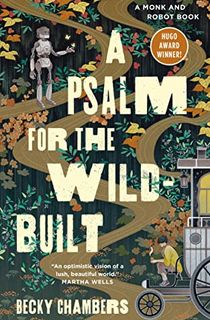
A Psalm for the Wild-Built
Many centuries ago, robots were built to serve the people of Panga. When they gained self-awareness, they laid down their tools and left behind humans to live alone in the wilderness. They haven't been seen since. Now, humanity is at peace.
Sibling Dex is a tea monk who travels from place to place with their caravan, offering tea to those who need it. They stumble across a robot, the first one seen in generations, and it has a question: "What do people need?" The monk and the robot become friends and allies as they make the journey to answer that question.
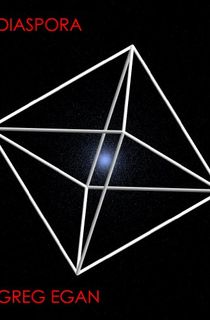
Diaspora
As the 31st century approaches, humanity has achieved success in interstellar travel and moved well beyond the confines of Earth. Many have even moved past the need for their human bodies, and now there are three kinds of descendants roaming the universe: fleshers, the true Homo Sapiens; Gleisner robots, who have the fully-working minds of human contained within machines; and polises, supercomputers teeming with billions of human personalities that exist without any kind of physical form.
Yatima is a polis being created from random mutations of the Konishi polis base mind seed. Through her eyes, we see how humanity has evolved and how a whole new kind of creation has come to dominate and reshape the very universe we inhabit.









